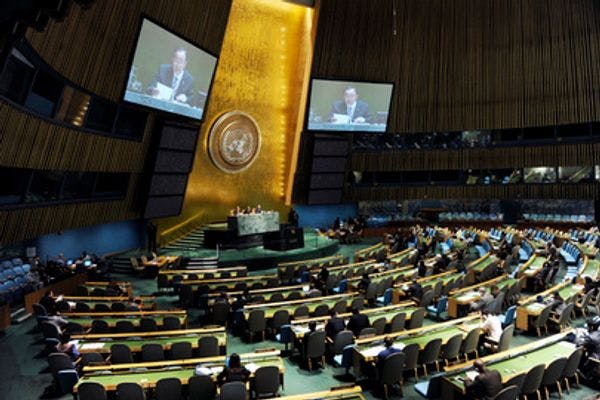Déclaration de l'IDPC à l'Assemblée Générale de l'ONU : « drogues et criminalité: menaces pour le développement »
Dans cette déclaration, l'IDPC appelle à la mise en place d’une stratégie sur la drogue intégrée et mettant l’accent sur la santé publique, l'inclusion sociale et le développement économique au travers de structures institutionnelles solides. Pour en savoir plus, en anglais, veuillez lire les informations ci-dessous.
____________________________________________________________________
Presentation of Mike Trace, Chairman of the International Drug Policy Consortium (IDPC), to the United Nations General Assembly debate on ‘Drugs and Crime as a Threat to Development’ – 26th June 2012, New York
Thank you Mr Chairman for allowing this opportunity for civil society to speak in this important debate. I speak here as Chairman of the International Drug Policy Consortium, a global network of NGOs that works to promote humane and effective drug policies.
Our members very much welcome this debate, and any attention given to the issue of drug policy by the New York UN family. This is an issue that would benefit from greater system-wide coherence.
Ladies and gentlemen, we have found over decades of commitment to drug control that we have been unable to eradicate illicit drug markets, or even to reduce them to insignificant levels. This reality has far reaching implications for our future strategies – we need to adjust our thinking away from ideas of eradicating or defeating the drug market, towards strategies for managing the market in a way that minimizes the negative impact on security, development, health and human rights.
As many distinguished delegates have pointed out, we have put too much reliance in the past on law enforcement and punishment as methods to overcome drug problems – indeed, it has often been the case that repressive tactics have actually made the problem worse – increasing violence, inhibiting development, and undermining health and social inclusion strategies.
Therefore, we agree that strategies going forward need to be broad based – balancing carefully planned activities to undermine the power and reach of organised crime, with a greater involvement and integration with public health, social inclusion, and economic development strategies. Debates on how best to achieve this balance are taking place now around the world, and the UN needs to take a lead in these debates.
This of course will present an institutional challenge for the UN – many speakers today have called for greater integration of drug control, organised crime, and development strategies, but there is currently no standing mechanism for the UN to ‘speak as one’ on these issues. We therefore call on the relevant UN bodies – the UNODC of course, but also the UN Development Programme, UNAIDS, the World Health Organisation, OHCHR, and others – to establish a mechanism to develop such an integrated strategy (one option could be to use the structure of the UN System Task Force on Drug Trafficking and Organised Crime).
We are in a period of significant review of drug control strategies, and increasingly vibrant debate on reform options is taking place at local, national and regional levels. We call on the UN to lead this debate, and to find robust institutional structures to rise to this challenge.
Thank you for your attention.
Keep up-to-date with drug policy developments by subscribing to the IDPC Monthly Alert.
Sujets
Régions
Profils associés
- International Drug Policy Consortium (IDPC)
